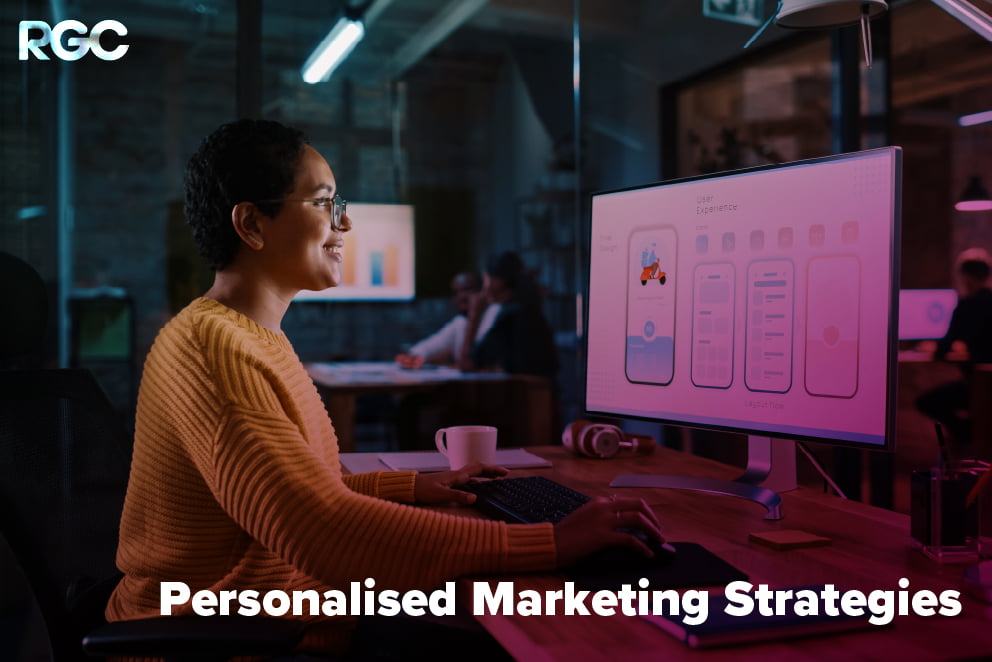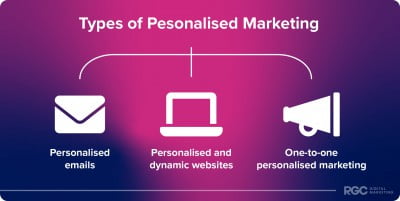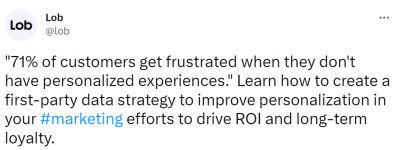Importance of Personalisation in Digital Marketing

There are many strategies and techniques to consider when implementing a digital marketing strategy for your brand, in order to communicate and connect with your audience effectively. The most effective way of engaging with your audience is to understand which data and strategies to use and introduce an element of personalisation to your digital marketing efforts.
Personalised marketing is an effective strategy to utilise in order to develop a personal relationship and connection with your audience. It is essential to understand what is involved with personalised marketing, the types and varieties of personalised marketing strategies you may utilise for your brand and the benefits that come along with personalised digital marketing.
What Is Personalised Marketing?
Personalised marketing is a digital marketing strategy that takes into account demographics and behavioural data to understand and create personalised messages for a brand’s current and prospective audiences. Personalised marketing is an effective marketing approach to engaging and communicating with your target audience.
Personalised marketing is used to grasp a deeper understanding of your brand audiences in order to tailor your marketing content and strategies towards them and create a personalised relationship with them. The three main categories of personalised digital marketing are behavioural, demographic and contextual factors.
Behavioural personalised marketing works to understand your audience’s behavioural patterns and analyses your audience’s interactions with your company, which may refer to how they interact with your website or their purchasing behaviour. Demographic personalisation will consider your brand’s audience’s age, gender, household income level, and race/ethnicity. Contextual personalisation will consider what stage customers are at within their journey to adequately tailor towards them.
Types of Personalisation In Marketing
Personalised Emails
Most people are aware of how effective email marketing is as a digital marketing technique for many brands, although personalising emails takes email marketing to a whole new level. Once a customer has shown interest in your brand in some way, it may be beneficial to personalise emails.
Many brands have begun to personalise emails for people who have abandoned carts where they have added items to their cart but did not complete the checkout process, or for people who are new subscribers or members to your business and you may wish to send them a personalised welcome email and acknowledge their orders.
Personalised and Dynamic Websites
A dynamic website utilises real-time data to provide a personalised experience to your clients and customers. Your brand’s website can be used to create an engaging customer experience that provides a more personalised and meaningful experience for your audience and customers.
To create this level of personalisation within a meaningful website experience, you may wish to identify how you can adjust your webpage to display specific information such as products and services first to meet your customer’s needs.
One-To-One Personalisation of Marketing
One-to-one personalised marketing refers to creating tailored and personal content created for specific audiences and customers in mind. In this technique, it is important to take into consideration the three main factors of behavioural, demographic and contextual marketing factors as mentioned earlier.
Understanding your audience’s demographics, geographical locations, the purchases they have made in the past to understand their patterns and preferences and the device they generally use whether it is a laptop or mobile phone, will help you tailor your content effectively to meet their criteria.

Benefits of Personalisation In Digital Marketing
There is a multitude of benefits to utilising personalised marketing within your digital marketing strategy to meet your business goals. One of the major benefits of personalised marketing is being able to grasp a deeper understanding of your customers and what their needs and wants are. It is beneficial to understand this information as it will help you understand what they need to make a purchase, and you may wish to make alternations to your current marketing strategies based on your findings to better suit your audience.
It is been shown that personalised marketing is an effective way to build higher levels of customer loyalty and brand recognition which all brands strive for. It has been shown that 71% of customers get frustrated when they don’t have personalised experiences. With this being said, these objectives are able to be met whilst lowering acquisition costs by providing what your customers want. Introducing customer profiles that showcase relevant information and content is a successful starting point for improving your brand’s ROI.

With the implementation of personalisation in marketing, you may find an increase in your customer engagement levels. Once you understand your customer’s psychological, behavioural and demographic data, tailoring your marketing strategies towards your customers will assist you in understanding their preferred platforms and the topics they want to hear about. It is important to understand your customer’s expectations and analyse all of the data you collect in order to see the results of your personalised marketing approach.

Engage with Personalised Digital Marketing
If you are looking to increase your brand awareness and engagement, improve your ROI and build meaningful relationships with your clients and customers, implement personalised marketing into your digital marketing strategy.
As the online world changes and adapts, it is important to stay up-to-date and grow with your audience. By focusing on what your customers need and are looking for, you are increasing your percentages of purchases and customer retention whilst creating the personal connection many customers are looking for.


